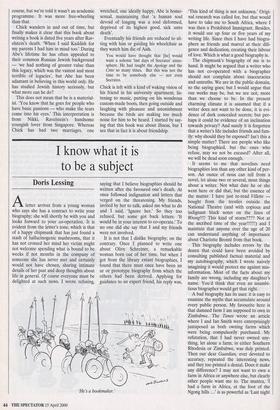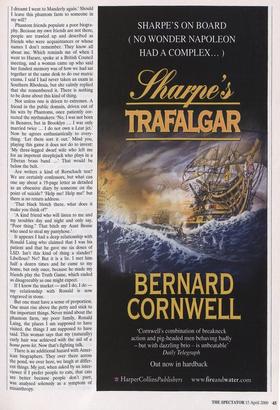I know what it is to be a subject
Doris Lessing
saying that I believe biographies should be written after the favoured one's death. At once followed indignation and letters that verged on the threatening. My friends, invited by her to talk, asked me what to do and I said, 'Ignore her.' So they too refused, but some got back letters: 'It would be in your interest to co-operate.' To no one did she say that I and my friends were not involved.
It is not that I dislike biography; on the contrary. Once I planned to write one about Olive Schreiner, a remarkable woman born out of her time, but when I got from the library extant biographies, I found that there must once have been an ur or prototype biography from which the others had been derived. Applying for guidance to an expert friend, his reply was, 'He's a bookmaker.' 'This kind of thing is not unknown.' Origi- nal research was called for, but that would have to take me to South Africa, where I was then a Prohibited Immigrant. Besides, it would use up four or five years of my writing life. Since then I have had biogra- phers as friends and marvel at their dili- gence and dedication, creating their labour of love. Which is what a good biography is.
The chipmunk's biography of me is to hand. It might be argued that a writer who has not co-operated with a biographer should not complain about inaccuracies and untruths. We are in the public domain, so the saying goes; but I would argue that our works may be, but we are not, more than we choose to be. In the present charming climate it is assumed that if a writer does not want to be done, it is evi- dence of dark concealed secrets; but per- haps it could be evidence of an inclination towards privacy? And surely it is forgotten that a writer's life includes friends and fam- ily: why should they be exposed? Isn't this a simple matter? There are people who like being biographied, but the ones who refuse, may we not be excused? After all, we will be dead soon enough.
It seems to me that novelists need biographies less than any other kind of per- son. An ounce of nous can tell from a novel, let alone two or several, most things about a writer. Not what date he or she went here or did that, but the essence of the matter. I have just re-read Villette — bought from the trestles outside the National Theatre (and with copious and indignant black notes on the lines of Wrong!!!! This kind of storm???? Not at the ascribed time of the year! I m and I maintain that anyone over the age of 20 can understand anything of importance about Charlotte Brontë from that book.
This biography includes errors by the dozen that could have been avoided by consulting published factual material and my autobiography, which I wrote naively imagining it would protect me against mis- information. Most of the facts about my family are wrong, including my daughter's name. You'd think that even an unambi- tious biographer would get that right.
A bad biography has its uses: it is easy to examine the myths that accumulate around every public person. My favourite here is that damned farm I am supposed to own in Zimbabwe. The Times wrote an article where I and Ian Smith were enterprisingly juxtaposed as both owning farms which were being compulsorily purchased. My refutation, that I had never owned any- thing, let alone a farm, in either Southern Rhodesia or Zimbabwe, was duly printed. Then our dear Guardian, ever devoted to accuracy, repeated the interesting news, and they too printed a denial. Does it make any difference? I may not want to own a farm in Africa or anywhere else, but clearly other people want me to. The mantra, 'I had a farm in Africa, at the foot of the Ngong hills ...' is as powerful as 'Last night I dreamt I went to Manderly again.' Should I leave this phantom farm to someone in my will?
Phantom friends populate a poor biogra- phy. Because my own friends are not there, people are trawled up and described as friends who were acquaintances or whose names I don't remember. They know all about me. Which reminds me of when I went to Harare, spoke at a British Council meeting, and a woman came up who said her fondest memory was of how we had sat together at the same desk to do our matric exams. I said I had never taken an exam in Southern Rhodesia, but she calmly replied that she remembered it. There is nothing to be done about this kind of thing.
Not unless one is driven to extremes. A friend in the public domain, driven out of his wits by Phantoms, once patiently cor- rected the mythrnakers: 'No, I was not born in Benares, but in Brooklyn ... I was only married twice ... I do not own a Lear jet.' Now he agrees enthusiastically to every- thing. 'Let them sort it out.' Mind you, playing this game it does not do to invent: 'My three-legged dwarf wife who left me for an impotent steeplejack who plays in a Tibetan brass band That would be below the belt.
Are writers a kind of Rorschach test? We are certainly confessors, but what can one say about a 19-page letter as detailed as an obsessive diary by someone on the point of suicide? 'Help me! Help me!' but there is no return address.
'That black blotch there, what does it make you think of?'
'A kind friend who will listen to me and my troubles day and night and only say, "Poor thing." That bitch my Aunt Bessie who used to steal my pantyhose.'
It appears I had a deep relationship with Ronald Laing who claimed that I was his patient and that he gave me six doses of LSD. Isn't this kind of thing a slander? Libellous? No? But it is a lie. I met him half a dozen times and he came to my home, but only once, because he made my friends play the Truth Game, which ended as disagreeably as one might expect.
If I know the market — and I do, I do — my relationship with Ronald is now engraved in stone.
But one must have a sense of proportion. One must rise above the petty and stick to the important things. Never mind about the phantom farm, my poor family, Ronald Laing, the places I am supposed to have visited, the things I am supposed to have said. This woman says that my (naturally) curly hair was achieved with the aid of a home perm kit. Now that's fighting talk.
There is an additional hazard with Amer- ican biographers. They over there across the pond, we over here, we laugh at differ- ent things. My jest, when asked by an inter- viewer if I prefer people to cats, that cats are better because people don't purr, was analysed solemnly as a symptom of misanthropy.



































































 Previous page
Previous page